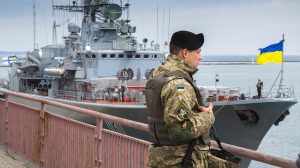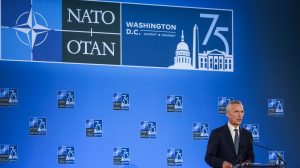Central Europe
Two United Nations agencies requested access on Tuesday to asylum-seekers stranded at Belarus’s border with Poland and Lithuania, after four migrants were found dead in the area. The International Organisation for Migration and the UN Refugee Agency called on the governments involved to be guided primarily by human rights and international law as they try to stop people from illegally entering the European Union from Belarus. The governments of Poland and Lithuania recently introduced states of emergency that deny entry to certain border areas to anyone except border guards and security services. They are also building razor wire fences along their border with Belarus. Poland’s authorities said three people who were found dead Sunday close to the Belarusian border died from hypothermia and exhaustion. Polish border guards also saw the body of a woman close to the border, on the Belarus side.
The European Union’s executive said on Thursday that risks to media freedom in Poland persisted despite a decision by the Polish regulator to extend a broadcasting licence for TVN24, a US Discovery-owned news channel critical of Warsaw. After long delays, the regulator on Wednesday extended the license for TVN24 but also asked the Polish parliament to provide more legal clarity over whether TVN24 had the right to continue operating. A spokesman for the European Commission told a daily news briefing in Brussels the extension was a “positive development” but added: “We are also aware of a special resolution in this context, adopted yesterday, on the rules on granting the broadcasting concessions for TV and radio channels.”
Swietokrzyskie province in southern Poland this week repealed its resolution declaring itself to be an “LGBT ideology free zone” in an extraordinary session of the provincial assembly. The 2019 declaration in “opposition to LGBT ideology” was scrapped after the European Commission had suspended negotiations on providing post-pandemic funding to the province. Switeokryzskie was part of a wave of 100 cities and regions that declared themselves “LGBT free” on the urging of the ruling Law and Justice party. While no councillors voted against the repeal of the designation, three abstained and 25 voted to support the repeal.
French telecoms firm Iliad said on Wednesday it had struck a deal with US cable operator Liberty Global to buy Polish fixed internet operator UPC for an enterprise value of seven billion złoty (1.78 billion US dollars). Iliad, which bought Polish mobile operator Play last year, said in July that it had made an indicative offer for the whole of UPC Poland. “After the purchase of Play end 2020, the acquisition of UPC Poland represents a new step for Iliad in the Polish telecoms market,” Iliad said in a statement. The group said the combined entity would become the second player in that market with pro-forma revenues of 1.96 billion euros (2.3 billion US dollars) for 2020 and earnings before interest, tax, depreciation and amortisation of 697 million euros.
Romania reported the year’s highest daily number of coronavirus infections on Thursday – 7,095 – as cases doubled within a week, authorities said, amid relatively low vaccination rates and the reopening of schools after the summer break. The peak in 2020 was about 10,300 infections, and public health officials this month estimated Romania could see 15,000-20,000 daily cases in October. The country is trailing the European Union in vaccination lists amid widespread distrust in state institutions, with nearly 31 per cent of its eligible 12+ population inoculated so far, just ahead of the bloc’s laggard Bulgaria. The EU’s average vaccination rate reached 70 per cent in September.
Czech online grocery delivery startiup Rohlik Group said on Thursday it will invest 400 million euros in warehouse automation by the end of 2025 to boost efficiency and capacity. The company, seeking to become Europe’s biggest online grocery delivery service, said in a statement it would invest 45 million euros in an initial phase, with further investments coming 2022-2025. Rohlik is installing a storage-bin system with integrated robot retrieval and order-picking work stations. It will launch at its German brand Knuspr.de in Munich and raise picking productivity threefold, the company said. That will be followed by a roll-out in existing and new European markets.
Czech President Miloš Zeman was released from hospital on Wednesday. Zeman was admitted to Prague’s military hospital on September 14 for what his office described later as a planned examination. It later said CT scans, sonography checks and blood tests carried out by doctors didn´t reveal any problems or disease that would threaten his life. The office said the president was only dehydrated and slightly exhausted. Due to similar reasons, he spent four days in the same hospital in 2019. Zeman, 76, is a heavy smoker who has suffered from diabetes and neuropathy linked to it. He has trouble walking and has been using a wheelchair.
Hungary’s national football team must play their next home World Cup qualifier behind closed doors and pay a fine of 200,000 Swiss francs as punishment for the racist abuse their fans aimed at England players in Budapest this month. Fifa’s disciplinary committee handed down the sanction after a section of supporters targeted Raheem Sterling and Jude Bellingham with monkey chants during England’s 4-0 win in a World Cup qualifier on September 2. The penalty of a second game without spectators was suspended period of two years. In July Hungary were ordered to play their next three Uefa home competition matches without supporters after incidents of racism and homophobia at Euro 2020, with one of those games suspended for two years. Those sanctions will apply in the Nations League next year. Hungary’s next World Cup qualifier is at home to Albania on October 9.
A mystery woman found bloodied and bruised on a rocky coastline in Croatia is a former jewellery designer for celebrities including Barbara Streisand, Diana Ross and Brigitte Bardot. The injured woman who speaks perfect English was unable to remember her name, where she was from or how she came to be hurt after being rescued on September 12. Police in Croatia released pictures of her in a bid to identify her and find out how she ended up with apparent memory loss on a craggy outcrop at a remote spot on the island of Krk. The woman has now been named by Croatian police as Daniela Adamcová, 57, who was born in Slovakia, but lived for many years in the United States, before possibly moving to Ireland and the UK. She is said to have been identified after police received ‘numerous tips’ from Croatia and abroad.

—
Eastern Europe
A volley of shots was fired at a car carrying Ukrainian President Volodymyr Zelensky’s principal aide on Wednesday in what a senior official called an assassination attempt. More than 10 bullets hit the car near the village of Lesnyky, around five kilometres outside the capital Kyiv, wounding the driver, a police statement said. It said a criminal case on suspicion of premeditated murder had been opened. A local television station said at least 19 bullet holes could be seen on the driver’s side of the car. A senior lawmaker said the aide, Serhiy Shefir, was not hurt. Shefir is close to the president, leading a group of advisers. Zelensky, who came to power on a promise to take on the country’s oligarchs and fight corruption, is currently in the United States at the UN General Assembly.
Belarus has extended the house arrest of a Russian student who was detained when Minsk ordered the forced landing of a Ryanair flight to arrest a dissident blogger, the BBC’s Russian service has reported. Russian citizen Sofia Sapega, 23, was arrested alongside her boyfriend, Belarusian opposition blogger Roman Protasevich, in May. The pair were traveling together from Athens to Lithuania, where they lived in exile. Authorities in Minsk have extended Sapega’s house arrest until December 25, her mother Anna Dudich told the BBC. Sapega faces three criminal charges: organising violations of public order, inciting hatred and organising mass unrest, each of which carry maximum sentences ranging from three to 15 years in prison.
The European Union has summoned Georgia’s envoy to Brussels, Vakhtang Makharoblishvili, after leaked files alleged the country’s security agency spied on the bloc’s diplomats and others. EU Ambassador to Georgia Carl Hartzell told reporters on September 22 that the alleged spying by “a close friend and partner like Georgia” raised serious questions about the relationship between the two and compliance with diplomatic norms. “A surveillance society is not what should be part of a democratic society,” Hartzell said. Georgian media have reported that thousands of leaked files, released by a whistleblower last week, showed the State Security Service eavesdropped on Hartzell, US diplomats, Israel’s ambassador, and other diplomatic missions in Tbilisi.
In a speech before the UN General Assembly in New York, Moldovan President Maia Sandu again called or the departure of Russian troops from Moldova’s breakaway Transnistria region. Some 1,400 Russian troops are still stationed in Transnistria, which declared independence from Moldova in 1990, ostensibly to protect Soviet-era arms depots. “I’d like to reiterate that our position with regard to the complete and unconditional withdrawal of the the Russian forces [from Transnistria] remains unchanged,” Sandu told the General Assembly on September 22. “This also includes the removal or the destruction of the munitions stored in the Cobasna depots that remain a threat for the security and the environment of the region and beyond. We count on the support of the international community in reaching this objective,” Sandu added. Transnistria fought a short war in 1992 with Moldova over fears that the newly independent country would seek reunification with neighbouring Romania.
North East Europe
Lithuania’s Defence Ministry has recommended that consumers avoid buying Chinese mobile phones and advised people to throw away the ones they have now, after a government report found the devices had built-in censorship capabilities. Flagship phones sold in Europe by China’s smartphone giant Xiaomi Corp have a built-in ability to detect and censor terms such as “free Tibet”, “long live Taiwan independence” or “democracy movement”, Lithuania’s state-run cybersecurity body said on Tuesday. The capability in Xiaomi’s Mi 10T 5G phone software had been turned off for the European Union region, but can be turned on remotely at any time, the ministry’s national cybersecurity centre said in the report.
A privately-funded expedition has begun examining the wreckage of the MS Estonia ferry that sank in 1994. The search was commissioned by relatives of the victims of the disaster, in an effort to gain more information on the vessel’s fate. A total of 852 people were killed when the MS Estonia sank in September 1994, in Europe’s worst peacetime maritime disaster. The vessel was traveling overnight from the Estonian capital Tallinn to Stockholm in Sweden when it went down in heavy seas. Only 137 of the 989 people on board survived, while most of the victims were Swedes and Estonians. The 1997 official joint investigation by Estonia, Finland, and Sweden concluded that the ferry sank as its bow door locks failed in a storm, flooding the decks in just 20 minutes. But the latest dive, organised by an Estonia-based fund, aims to “find answers to questions” that official joint and separate investigations have failed to provide.
South East Europe
The border between Kosovo and Serbia remains blocked as ethnic Serbs protest a decision by the Prishtina authorities to start removing Serbian license plates from cars entering the country. The ongoing dispute has raised fears that it may unleash much deeper tensions between the two neighbours. Kosovar Prime Minister Albin Kurti said on September 22 that his country and Serbia should start recognising each other’s car license plates to allow free movement of people and goods and ease border tensions. Kurti called on Serbs to move vehicles away “because they are blocking themselves”. “Our offer is very practical, let’s lift the temporary plates, in Serbia and in Kosovo,” Kurti said at a government meeting.
The former chief prosecutor of Albania has been sentenced to two years in prison for hiding money involved in illegally owned properties. Adriatik Llalla, who served as Albania’s prosecutor general during 2012-17, also had his own property confiscated by judges and is barred from holding any public post for five years. In May, he was convicted and sentenced by an Albanian court that handles top officials’ corruption cases. The court found the former prosecutor guilty of hiding property and giving false information on the asset declarations that officials must submit every year. He had failed to justify how he had financed the purchase of 5.4 acres of land and a new apartment, as well as his family’s expenses in the United States and Germany. The Tirana Appeals Court rejected Llalla’s appeal on Wednesday and upheld the verdict.
Central Asia
An armed confrontation between a deeply indebted homeowner facing eviction, bailiffs and police officers ended with five people dead on September 20, once more shining a light on the toll taken by the phenomenon of easy credit in Kazakhstan. Fatalities comprised the man who had acquired the house where the clash happened, along with his friend, as well as two police officers and a bailiff. The 54-year-old suspected shooter, who is the head of the family threatened with eviction, is in custody. In a troubling detail for the authorities, much of the public response to this incident in the southern city of Almaty has dwelled not on the killings themselves, but on the perceived excesses of banks issuing unaffordable credit. Anaida Demirchyan, the wife of the suspected shooter, told reporters that her family were being evicted from their home and that her husband had been “driven to despair by lawlessness in Kazakhstan and the arbitrariness of banks.”
Kazakhstan will switch from its current Russian dialling code, +7, to its own national international dialling code, +997, the government said this week. The Ministry of Digital Development announced the policy change on September 21, saying it would be coordinated with Russia. The former Soviet republic plans to switch to a new national prefix from January 2023 and the transition plan has been discussed with telecom operators. When the new code goes into effect, the new and old codes can be used in parallel for two years. The full transition is expected to take effect as of 2025.
Turkmen President Gurbanguly Berdymukhammedov has issued a pardon to more than 2,000 prisoners ahead of the former Soviet state’s Independence Day on September 27. State media reported on September 20 that the authoritarian president signed a decree releasing 2,064 prisoners based on the “principles of mercy and humanism bequeathed by our great ancestors.” Six of the pardoned prisoners are reportedly foreign nationals from unspecified countries. Berdymukhammedov, who rules the closed country with an iron fist, issues such pardons several times a year, usually on the eve of state or religious holidays. Such acts usually do not cover political prisoners.
The organisation that oversees London’s gold trading blocked metal mined in Kyrgyzstan from entering the city’s market, dealing a blow to the central Asian nation’s bullion-dependent economy. The London Bullion Market Association said last Friday it had suspended Kyrgyzaltyn OJSC, Kyrgyzstan’s state-owned gold producer, from its list of acceptable refiners. The list sets standards in London’s gold market, one of the world’s biggest, and is regarded as an international benchmark. Traders and officials have said the move will likely restrict Kyrgyzaltyn from selling bars in other gold hubs including Switzerland and New York.
Unlike many news and information platforms, Emerging Europe is free to read, and always will be. There is no paywall here. We are independent, not affiliated with nor representing any political party or business organisation. We want the very best for emerging Europe, nothing more, nothing less. Your support will help us continue to spread the word about this amazing region.
You can contribute here. Thank you.








Add Comment